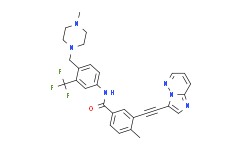In a survival model in which mice are instead injected with Ba/F3 BCR-ABL cells, administration of Dasatinib at doses as high as 300 mg/kg has no effect on survival time. By contrast, treatment with Ponatinib (AP24534) prolongs survival in a dose-dependent manner. Ponatinib dosed orally for 19 days at 5, 15, and 25 mg/kg prolongs median survival to 19.5, 26, and 30 days, respectively compare to 16 days for vehicle-treated mice (p<0.01 for all three dose levels). The anti-tumor activity of Ponatinib (AP24534) is further assessed in a xenograft model in which Ba/F3 BCR-ABL cells are injected subcutaneously into mice. Tumor growth is inhibited by Ponatinib in a dose-dependent manner compare to vehicle-treated mice, with significant suppression of tumor growth upon daily oral dosing at 10 and 30 mg/kg (%T/C = 68% and 20%, respectively; p<0.01 for both dose levels). Daily oral dosing of 50 mg/kg Ponatinib causes significant tumor regression (%T/C = 0.9%, p<0.01), with a 96% reduction in mean tumor volume at the final measurement compared to the start of treatment. Ponatinib is well tolerated at all efficacious dose levels for the duration of the study; maximal decreases in body weight are <5%, <5%, and <12% for the 10, 30, and 50 mg/kg dose groups, respectively, with no signs of overt toxicity.
Ponatinib (1-25 mg/kg) is administered orally, once daily for 28 days, to mice bearing MV4-11 xenografts. Ponatinib potently inhibits tumor growth in a dose-dependent manner. Administration of 1 mg/kg, the lowest dose tested, leads to significant inhibition of tumor growth (TGI=46%, P<0.01) and doses of 2.5 mg/kg or greater results in tumor regression.
Medlife has not independently confirmed the accuracy of these methods. They are for reference only.



 扫码关注公众号
扫码关注公众号